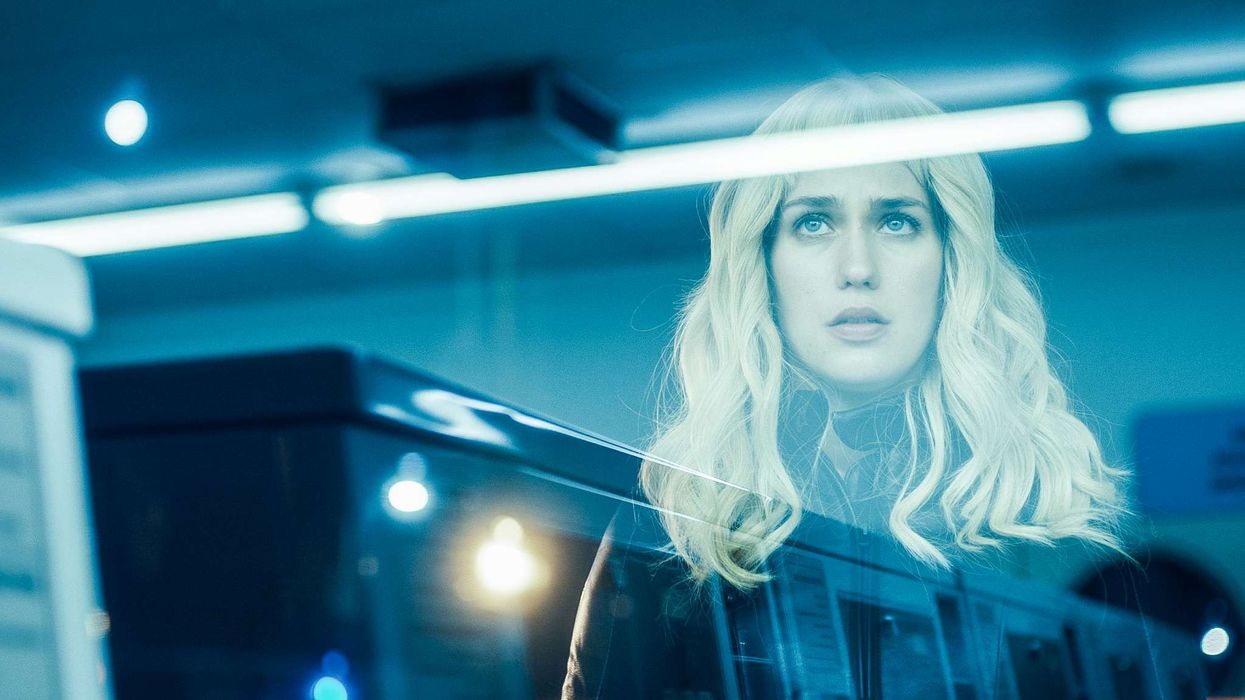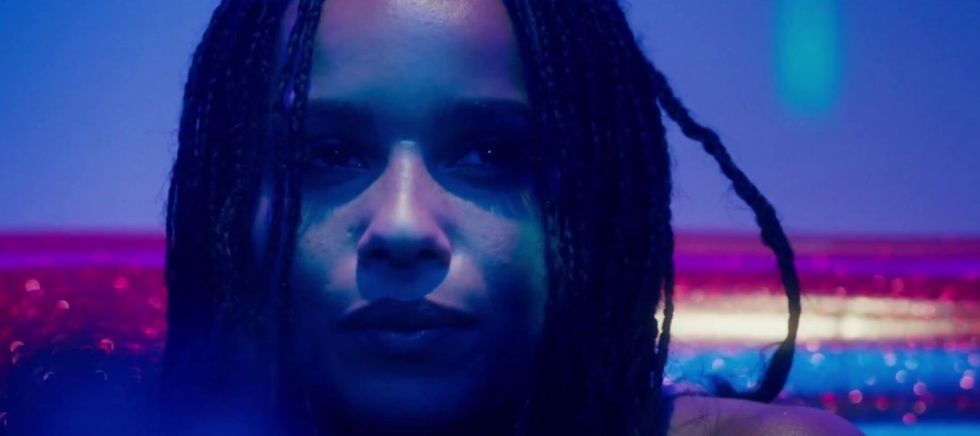'Gemini': Why Aaron Katz Didn't Let Genre Dominate His Genre Film
Aaron Katz's 'Gemini,' a neo-noir starring Lola Kirke and Zoë Kravitz, is a slow-burn murder mystery set in an alienating Los Angeles.

The characters in Gemini move listlessly—and sometimes recklessly—through a neon-saturated Los Angeles, where just below the veneer of a polished Instagram picture lurks a chaotic underworld of mal intentions. Aaron Katz's film stars Lola Kirke as Jill, a personal assistant to an erratic actress (Zoë Kravitz). After pulling out of a major film at the 11th hour, Heather has just pissed off a cadre of very important Hollywood producers, not to mention her rabid fanbase. It's best to go into Gemini without knowing what happens next—suffice to say this is a murder mystery.
No Film School caught up with Katz and his longtime composer Keegan DeWitt to discuss how they captured the hyper-stylized aesthetic of '80s and '90s thrillers, how they avoided the pitfalls of a genre film, and what directing his fifth feature has taught Katz about success and failure in indie film.
No Film School: This is a very stylized film that is evocative of many '80s and '90s thrillers. What were your original references or inspirations?
Aaron Katz: There are a few threads that came together to get me to start writing this. One was just moving to Los Angeles about five years ago. I didn't know what I would think of the city when I moved here, but I began to love it and become very curious about it. I wanted to make [a film] set here.
And at the same time, I was also watching a lot of thrillers and wanting to do something that was in the tradition of the world of '80s and '90s thrillers—the kind of thing that you might watch on VHS. We were inspired by American Gigolo, Bad Influence, Body Heat, and some other films from the '80s and '90s. At the time, these movies were viewed not as art, but as B-movies. People didn't take them very seriously. But looking back on them, I think many of those are great movies and are quite understated in some ways.
I was also interested in the relationship between a personal assistant and the person they're working for, because the lines between personal and professional are so porous. It seemed to be a very interesting starting place, especially for a thriller. The relationship felt like it would be very rich.
"I wanted Lola and Zoë to not play to the genre. If they were these characters, how would they live with those circumstances?"
NFS: How did you go about incorporating the thriller or mystery-esque aspects into the script?
Katz: Well, I kind of knew where the movie was going, even before I started writing. Even before I knew who the characters would be exactly, I had this idea of one of them winding up dead and then you have that twist at the end. It was really about figuring out how to get there. I started writing it with just a few mileposts along the way of where I knew I wanted to go. And within that, I wrote a very free-form first draft. I find that writing that way—rather than, for example, off of note cards—for me, it ends up feeling like the relationship between the characters is a little more robust.
NFS: And then, eventually, how did you bring those thriller elements off the page? It can be difficult to establish that kind of tension on set.
Katz: I think part of it is just taking the circumstances as they come—taking them at face value. I wanted Lola and Zoë to not play to the genre. If they were these characters, how would they live with those circumstances? Then, it's kind of up to us to shoot that and to have the score and the pace of editing all support the atmosphere of the movie.
NFS: How did you and your cinematographer work together to create that '80s/'90s aesthetic?
Katz: Andrew Reed, our director of photography, and I have worked on four movies together. Also, for our colorist, Alex Bickel, this is our fourth movie together. So we all got together beforehand and really planned out the color palette of the movie and how we wanted to approach the look of it.
"Every time you're writing or directing something, you kind of have to believe it is the most important thing in the world."
NFS: In accordance with that aesthetic, you employed some interesting camera movies. For example, I remember a scene in which you were dollying back and forth from the kitchen to the couch in Jill's apartment as the two characters talked to each other from different rooms.
Katz: Reed and I would go and look at locations and ask ourselves, "How can we make the most of this place? What's compelling about this place?" I really like feeling the geography of a space and setting up shots that capture what it's like to be in a room or on the street. We're so influenced by where we are and what we see around us that, whenever possible, I like to really establish that space for the characters.

Katz: For the shot that you're talking about, it was really important to me to feel the layout of that apartment. And actually—not in the case of that shot, but in many other cases—some of the geography that's established then becomes important to the plot later. So for example, when we see Zoë and Lola get off of the elevator at Jill's apartment and go up and over to her apartment door, later, it becomes important when Lola comes back to her apartment after she thinks Zoë is dead.
NFS: How did you approach the music composition process?
Keegan DeWitt: We did it once and then had to do it again.
Katz: Yeah, we've never done that before. I mean, Keegan and I have worked together on all five of my movies, and we actually went to high school together, too, so we've known each other for more than 20 years. And on all the other movies, Keegan would write something, even before we shot, and I would often be revising the script while listening to things that Keegan was working on, and those demos would grow into the score, and we could see a linear line of progression.
"The score that we had been working on felt like it was speaking to the genre of the movie, but it wasn't speaking to these characters living in the here and now."
In this case, though, we started in a different direction, and we realized pretty deep into the editing process—we were showing people rough cuts—that something about it was making people feel a little off. And what we realized is that the score that we had been working on—which was inspired by Giorgio Moroder, Tangerine Dream, John Carpenter, and so forth—felt like it was speaking to the genre of the movie, and maybe some of the nostalgia of the movie. But it wasn't speaking to these characters living in the here and now. We realized we needed to shift directions.
So yeah, Keegan, you were lying on the floor one night in the editing room, otherwise known as a room in my house.

Thanks to how Aaron's written it and how it's shot, the movie has this really interesting, subtle heartbeat to it that's moving everything along. Figuring out how to match that musically—where you're never outright crazy energy, but it's always bubbling just beneath the surface—was a really hard thing to figure out.
Katz: Yeah, that's a really good way to put it, "bubbling beneath the surface." It felt like the first score was just really hitting you hard, and it didn't allow the space that the movie needs in the first 30 minutes, especially.
"As I get older, I've felt more and more that my job [as director] is to facilitate everyone else doing their best work."
NFS: Can you think of any specific challenges that you encountered on set that were new, given you've directed five features now?
Katz: That's a really interesting question. I mean, there were challenges every day, for sure. You can anticipate a thousand things that can go wrong, but maybe you didn't anticipate the thousand-and-first thing. Like this road that leads up to a shooting location... Well, actually, there's a bend in it, and the big trucks can't make that bend, so now everything has to come up in pickups. So there was always that kind of thing going on, but I was very fortunate to have great producers and a great AD who managed all of those daily crises.
As those crises are happening, it's important to keep a calm atmosphere on set. As I get older, I've felt more and more that my job [as director] is to facilitate everyone else doing their best work. And for the actors, that's putting people in the frame of mind that we're not gonna worry about the fact that things are running late, or that there's a problem with the trucks or the parking or whatever it is. We're just gonna focus on our job. And for the director of photography, we're gonna figure out how to shoot this scene as elegantly and efficiently as possible.

NFS: If you could talk to yourself when you were making your first film, what are some of the kinds of things that you would say?
Katz: I think I would say that there's going to be a lot of frustrations ahead, and a lot of times, you don't feel like a filmmaker. For example, on my first film, I remember we didn't have a distributor, but we did book a theater in New York—a theater that doesn't exist anymore, called the Two Boots Pioneer Theater on Avenue A. On opening night, six people showed up. It was just so monumentally depressing. There are so many moments like that where things that you think will be a triumph end up being bad, and it feels like you're not getting anywhere.
Don't be overcome by frustration and depression. Every time you're writing something or directing something, you kind of have to believe it is the most important thing in the world. If you stop for a second and think, "What? Maybe this is never gonna get made?" It can feel very overwhelming and can feel very sad.
I've realized as I've gotten older that virtually every filmmaker I know goes through these same things. When I was 22, it felt like the end. It sometimes feels like a crisis that couldn't be recovered from. But I wish I could have gone back and told myself, "It's okay. Just keep working." Other people told me that, and I didn't listen!
'Gemini' is currently in theatres nationwide.

 "'Back Home"via Mercedes Arutro
"'Back Home"via Mercedes Arutro 'Back Home'via Mercedes Arutro
'Back Home'via Mercedes Arutro 









